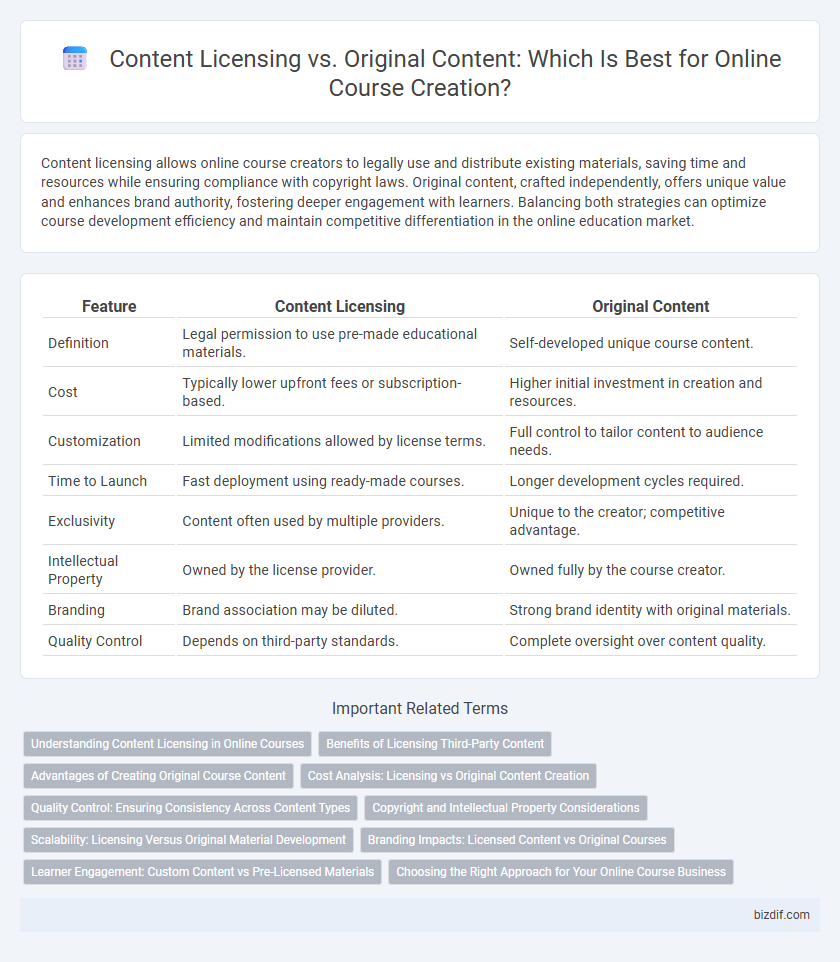Content licensing allows online course creators to legally use and distribute existing materials, saving time and resources while ensuring compliance with copyright laws. Original content, crafted independently, offers unique value and enhances brand authority, fostering deeper engagement with learners. Balancing both strategies can optimize course development efficiency and maintain competitive differentiation in the online education market.
Table of Comparison
| Feature | Content Licensing | Original Content |
|---|---|---|
| Definition | Legal permission to use pre-made educational materials. | Self-developed unique course content. |
| Cost | Typically lower upfront fees or subscription-based. | Higher initial investment in creation and resources. |
| Customization | Limited modifications allowed by license terms. | Full control to tailor content to audience needs. |
| Time to Launch | Fast deployment using ready-made courses. | Longer development cycles required. |
| Exclusivity | Content often used by multiple providers. | Unique to the creator; competitive advantage. |
| Intellectual Property | Owned by the license provider. | Owned fully by the course creator. |
| Branding | Brand association may be diluted. | Strong brand identity with original materials. |
| Quality Control | Depends on third-party standards. | Complete oversight over content quality. |
Understanding Content Licensing in Online Courses
Understanding content licensing in online courses involves knowing the rights and restrictions associated with using third-party materials, which can include copyrights, trademarks, and usage agreements. Licensed content provides legal access to pre-existing resources such as videos, images, or texts, enabling educators to enhance their courses without creating everything from scratch. Clear knowledge of licensing terms ensures compliance, prevents copyright infringement, and supports the ethical use of educational materials.
Benefits of Licensing Third-Party Content
Licensing third-party content for online courses offers access to high-quality, professionally produced materials without the time and expense of original content creation. This approach ensures legal compliance and reduces risks associated with copyright infringement, providing peace of mind for course creators. Leveraging licensed content also enables faster course development and the ability to incorporate diverse perspectives that enrich the learning experience.
Advantages of Creating Original Course Content
Creating original course content ensures unique intellectual property, enhancing brand authority and reducing risks of copyright infringement. It allows customization tailored to the target audience's specific learning needs, increasing engagement and course effectiveness. Moreover, original content offers long-term value through exclusive rights, enabling monetization opportunities across multiple platforms.
Cost Analysis: Licensing vs Original Content Creation
Content licensing reduces upfront costs by allowing course creators to access pre-made materials, saving time and resources compared to developing original content from scratch. Original content creation demands higher initial investment due to research, production, and quality assurance but provides full control, exclusivity, and potential long-term brand value. Analyzing cost efficiency involves balancing immediate expenses against long-term benefits like customization flexibility and intellectual property ownership.
Quality Control: Ensuring Consistency Across Content Types
Content licensing offers a streamlined way to access professionally created materials, ensuring baseline quality standards and legal compliance. Original content creation allows full control over tailored messaging and unique value, but demands rigorous quality control protocols to maintain consistency across various formats. Implementing standardized style guides and review processes guarantees that both licensed and original content uphold the same level of professionalism in online course delivery.
Copyright and Intellectual Property Considerations
Content licensing enables online course creators to legally use third-party materials while ensuring compliance with copyright laws and avoiding intellectual property infringement. Original content, protected by copyright, offers exclusive rights and control, enhancing brand value and minimizing legal risks. Understanding the distinctions in copyright ownership and licensing agreements is crucial for safeguarding intellectual property in online course creation.
Scalability: Licensing Versus Original Material Development
Content licensing enables rapid scalability by providing ready-made materials, reducing time-to-market and development costs for online courses. Original content development requires significant time and resources but offers unique branding and full control over intellectual property. Balancing licensed content with proprietary materials maximizes scalability while maintaining course differentiation and value.
Branding Impacts: Licensed Content vs Original Courses
Licensed content provides quick access to proven materials, enhancing course credibility but may dilute unique brand identity due to widespread use across platforms. Original content empowers creators to establish a distinct brand voice and tailored learning experiences, fostering deeper student engagement and long-term loyalty. Investing in original courses strengthens brand differentiation and positions the educator as an authoritative thought leader in their niche.
Learner Engagement: Custom Content vs Pre-Licensed Materials
Custom content tailored to specific learner needs significantly boosts engagement by addressing unique learning preferences and industry relevance. Pre-licensed materials offer convenience and proven quality but often lack personalization, resulting in lower motivation and interaction. Investing in original content development maximizes learner retention and satisfaction by fostering a more immersive educational experience.
Choosing the Right Approach for Your Online Course Business
Choosing the right approach between content licensing and original content is crucial for scaling your online course business efficiently. Content licensing offers faster course deployment and access to proven materials, while original content allows for brand differentiation and tailored student experiences. Evaluate factors such as budget, time constraints, and long-term branding goals to determine the best strategy for sustainable growth.
Content licensing vs Original content Infographic

 bizdif.com
bizdif.com